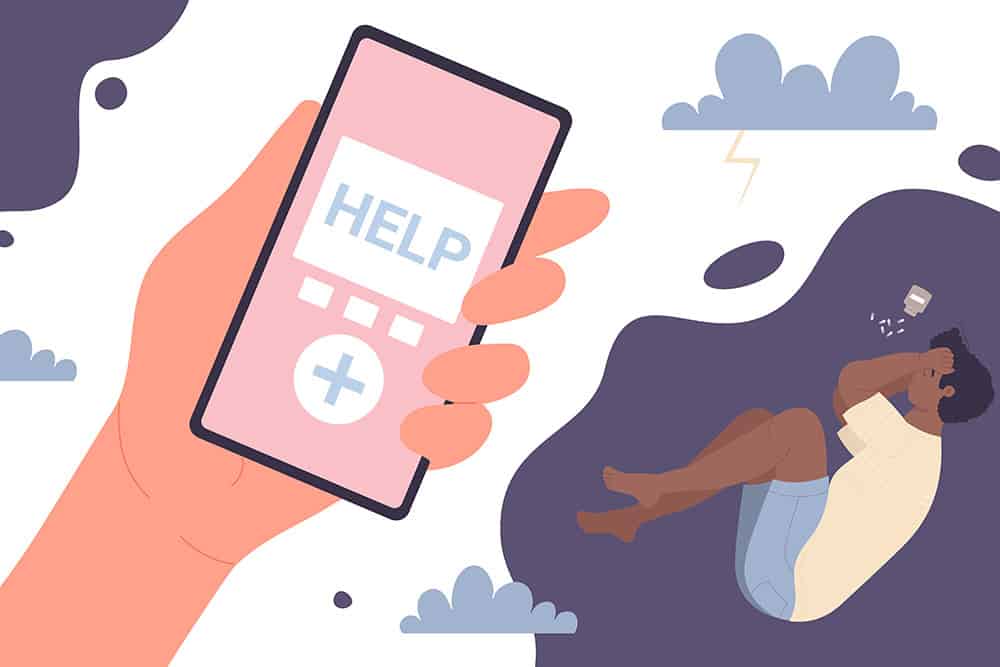
Mental health challenges affect us all. It’s a completely normal part of life. But there are times when these challenges and contributing factors are simply too much to bear and can cause us to have a mental health crisis.
In this blog we will look at what a mental health crisis is, the possible causes, symptoms to look out for and how to plan for a crisis.
What Is A Mental Health Crisis?
A mental health crisis is when you feel that you have reached breaking point and you need urgent help, according to the mental health charity Mind.
During a crisis you might be:
- Self-harming
- Feeling suicidal
- Experiencing extreme anxiety or having a panic attack
- Having an episode of psychosis or extreme paranoia
A crisis puts you in danger but can also have an effect on the safety of those around you.
What Can Cause A Mental Health Crisis?
There are a variety of factors that can bring about a crisis. You may be dealing with a bereavement, financial issues, workplace/exam stress, a relationship breakdown or family problems. Suffering abuse or living with an addiction can also have profound effects on your mental health and can trigger a crisis.
The likelihood of suffering a mental health crisis is also increased if you already have an existing mental health condition. For example, if you already suffer with General Anxiety Disorder (GAD), then any one of the above factors can trigger a mental health crisis.
Signs of A Possible Mental Health Crisis
The signs of a potential mental health crisis are not always obvious. They can be hard to spot, presenting themselves in a range of ways. Remember, we’re all unique, so understanding your mental wellbeing or an awareness of the mental wellbeing of a loved one or colleague can help you to understand when there are changes in behaviour.
There are some common signs that you should look out for, like:
- Out of character behaviour such as aggression and violence
- Impulsive behaviour – alcohol/substance abuse or self-harm
- Difficulty completing daily tasks like upkeep of personal hygiene and eating
- Isolating from friends, family and colleagues
- Extreme mood swings
- Altered sleeping patterns and eating habits
- Signs of psychosis – hearing voices, seeing things that are not there
- Suicidal thoughts
If you are living with a mental illness, some of the above may be things you experience on a regular basis. The key is to understand what your ‘normal’ is so that you are aware of anything that is not typical.
Being Prepared for a Mental Health Crisis
Mental health crisis planning can be very impactful. Having a plan in place can lessen the extent of a crisis and help others to know how best to support you.
Planning can include:
- Speaking with your doctor, to understand what treatment and support is available to you
- Researching local mental health services in your area, to see what crisis services they provide
- Making note of helplines – saving their numbers and listing their opening times
- Keeping a self-care box where you put personal items– this can provide comfort and distraction in the time of a crisis
- Downloading mental health services apps such as the Stay Alive App, a pocket suicide prevention app

Social Services
If you have an existing mental health condition and you have a social worker, you can discuss support options with them.
Friends and Family Support
If you feel comfortable doing so, speak to friends and family and let them know how best they can support you when you feel at crisis point. You can also educate them on the signs to look out for so that they can offer support if they see a change in your everyday behaviour.
Mental Health Advocacy
Sometimes having mental health conditions can mean that others may not take you seriously. When you have a skin condition on your hand or you have your broken arm in plaster, the physical evidence is obvious. But, it isn’t the case with a mental health condition. This can be extremely frustrating, so having someone who understands what you’re dealing with, to advocate and speak on your behalf, is usually beneficial. They can communicate your wishes and help you express your views. An advocate can be a friend or family member.
Advance Statement
In some cases, going through a mental health crisis may mean that you are unable to make decisions on the treatment you wish to receive. This is legally known as losing mental capacity. Writing a statement about what you would want to happen at such a time can help to ensure your wishes are followed.
An advance statement could include things like:
- The type of treatment you want to receive
- Who should be contacted if you experience a crisis
- Religious or spiritual requests you may have
- Food/dietary preferences
Your GP, social worker or other healthcare professional can help you put an advance statement together. Its worth noting that advance statements are not legally binding, so healthcare professionals are not required to follow them but they should aim to carry out your wishes wherever possible.
Crisis Cards
A crisis card is a pocket-sized card that fits into your wallet, purse, pocket or slots in your mobile phone case. It holds key details on how you would like to be helped in a crisis and can be shown to others at the time of the crisis.
What Do You Do in A Mental Health Crisis?
If you believe you are experiencing a mental health crisis, it’s best to seek help immediately. Waiting can make matters worse and acting fast can reduce the impact of the crisis and ensure that you get the help you need and deserve. The same applies if you identify that a loved one or colleague is in crisis.
When things get to crisis point you can:
- Go to your nearest A&E department
- Go to a walk-in urgent psychiatric care center
- Call your mental health professional, if you have one, or their emergency line if your crisis happens out of working hours
- Call 999 if you believe you or someone else is in immediate danger
If you’re alone but have support systems in place such as friends and family, or if your workplace has mental health first aiders, you can let them know you are in crisis so that they can accompany you to A&E. They can also help you to make any necessary arrangements or phone your local services on your behalf.
Educate Yourself on Mental Health Matters
Our mental health is complex, so learning about our minds is an ongoing process. There is a wealth of information on the Human Focus website – from courses to more blogs and free infographics that aim to educate, inform and provide you with knowledge on how to achieve positive mental health.
About the author(s)






















































































































































































































































































































































































































































































































































